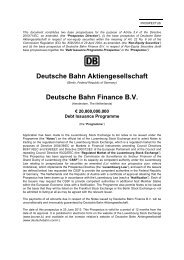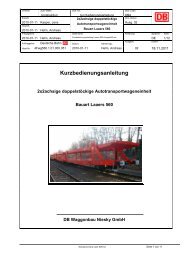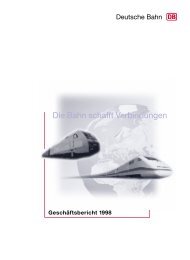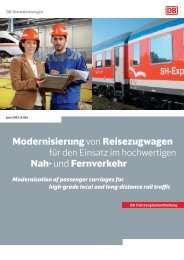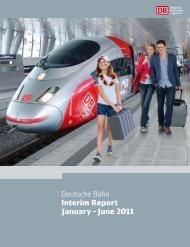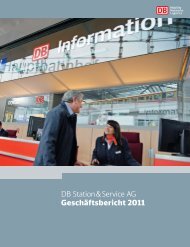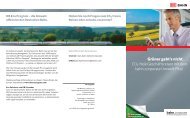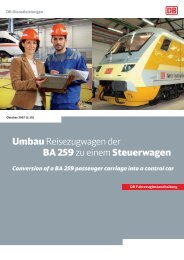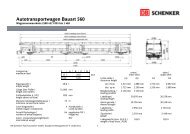PDF Download - Deutsche Bahn AG
PDF Download - Deutsche Bahn AG
PDF Download - Deutsche Bahn AG
You also want an ePaper? Increase the reach of your titles
YUMPU automatically turns print PDFs into web optimized ePapers that Google loves.
|<br />
mAN<strong>AG</strong>EmENT rEPOrT<br />
Operating risks<br />
We operate a technologically complex, networked production<br />
system within the rail transport sector. risks arise for our rail<br />
activities due to service interruptions, in particular because of<br />
the resulting decline in punctuality. A substantial reduction in<br />
punctuality in long-distance transport diminishes the perceived<br />
quality of service and can lead to a loss of customers. Furthermore,<br />
in regional transport there is also the additional risk of<br />
incurring penalty fees levied by the responsible contracting<br />
organization in the event of train cancellations or insufficient<br />
punctuality. The availability of our vehicle fleet is an additional<br />
critical factor. Significant limitations can endanger scheduled<br />
operations. DB Group attempts to eliminate this risk by taking<br />
precautionary measures and in the case of occurrence to minimize<br />
the impact by, for example, providing substitute vehicles or<br />
organizing substitute transports.<br />
In rail freight transport the punctuality of transports is<br />
an important criteria used by our customers to select the mode<br />
of transport. In addition, irregularities may occur during the<br />
conduct of transport operations such as violations of customs<br />
regulations or theft. We combat these risks by employing<br />
qualified customs coordinators, as well as a special system that<br />
immediately notifies us when tax assessments are received.<br />
We generally counter the risk of operational disturbances<br />
with systematic maintenance and the use of qualified staff,<br />
coupled with continuous quality assurance and the improvement<br />
of our processes. The nature of the railway business as an open<br />
system, however, means that we have limited influence on<br />
certain factors that have a potentially negative impact on our<br />
flow of operations. In this case, we strive to limit the possible<br />
consequences.<br />
Technology risks<br />
The range and quality of the services we offer depends greatly<br />
on the availability and reliability of the production resources<br />
used, procured preliminary work as well as the quality of our<br />
partners’ performance. We engage in intensive quality dialogues<br />
with our relevant suppliers and business partners.<br />
In addition, the technical production resources used in rail<br />
transport must fulfill applicable norms and requirements, which<br />
may change over time. As a consequence, technical objections<br />
regarding vehicles could occur. The risk here is that individual<br />
model series or wagon categories cannot be used for operations,<br />
or may only be used on a restricted basis – for example, at lower<br />
speeds, shorter maintenance intervals, or lower wheel set<br />
loads. Furthermore, newly procured vehicles can fail to receive<br />
certification and then not be delivered as agreed with the<br />
manufacturer. These occurrences could lead to disturbances in<br />
operational processes as well as higher expenses.<br />
It cannot be ruled out that the intervals between maintenance/ultrasound<br />
inspections will be further shortened in the<br />
future. Due to this, additional operational restrictions could<br />
occur if the size of the vehicle fleet remains unchanged.<br />
Furthermore, possible changes in norms and the rail infrastructure<br />
are important elements of overall operating conditions.<br />
Here again, operations can be restricted or even cancelled in the<br />
event of deviations from the norm. In order to counter these risks<br />
we have consolidated the respective activities in DB Group and<br />
engage in an active dialogue with the responsible authorities.<br />
Procurement risks<br />
Procurement prices for commodities, energy and transport<br />
services can shift depending on the market situation. Therefore,<br />
depending on the market and competitive situation, it is not<br />
possible – or only possible to a limited extent – to pass on higher<br />
costs to customers. This will have a correspondingly negative<br />
effect on margins.<br />
We counter the risk of higher energy prices through the use<br />
of appropriate derivative financial instruments.<br />
31




